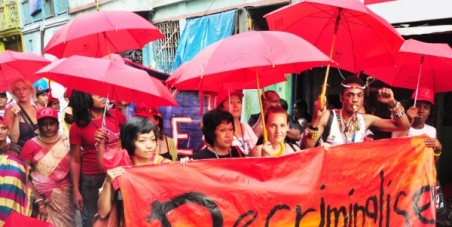
All Country Heads: Full decriminalisation of sex work
In environments where many aspects of sex work are criminalised, for instance, soliciting, living off the earnings of a sex worker [families and children suffer the most], managers ; sex workers face discrimination and stigma which undermine their human rights, including to liberty, security of the person, equality, and health. Evidence suggests that sex workers’ risk of HIV infection is inextricably related to their marginalized and illegal status, which drives their work underground and increases police abuse and exploitation.
According to the UNAIDS Guidance Note on HIV and Sex Work, “even where services are theoretically available, sex workers and their clients face substantial obstacles to accessing HIV prevention, treatment care and support, particularly where sex work is criminalized.” In countries where sex work is decriminalized, there is evidence that violence directed at sex workers is reduced, relations between sex workers and the police are improved, and access to health services is increased.
Punitive laws that criminalise and punish sex work act as instruments through which sex workers are harassed and regularly have their human rights violated by law enforcement agencies, health authorities and clients. In many countries, sex workers are a primary means by which the police meet arrest quotas, extort money, and extract information. Police wield power over sex workers in the form of threats of arrest and public humiliation and use condoms as evidence of illegal activity, undoing years of effective public health promotion and campaigning around STIs and HIV. 567 Forced testing for HIV is commonplace, along with breaches of due process and privacy.
Sex workers in many jurisdictions are the targets of frequent harassment, physical and sexual abuse, and forced “rehabilitation”. Where sex work is illegal, sex workers often feel there is little they can do to address the violations perpetrated against them and are deterred from accessing health services for fear of further stigma and abuse.
Sex workers support Amnesty’s analysis of the human rights context of sex work and the health considerations and other implications for sex workers. The removal of punitive laws and policies targeting sex workers is imperative. International agencies such as The Global Commission on HIV and the Law , UNAIDS , the World Health Organization , the Global Alliance Against the Trafficking in Women (GAATW) and Human Rights Watch have called for or support the decriminalisation of sex work. Decriminalisation is not an attempt to legalise ‘pimps’, nor does it increase exploitation of sex workers. Such arguments are made with a limited understanding of the sex trade and undermine sex workers’ struggle for the right to health and justice.
Decriminalisation will help sex workers organise and address all forms of exploitation, including abusive, sub-standard or unfair working conditions instituted by both state and non-state actors. The sex workers’ rights movement is aligned with the human and women’s rights movements in condemning the abuse and violation of the rights of women, including sex workers. Sex work must not be equated with sexual exploitation or sex trafficking.
Meena Saraswathi Seshu SANGRAM, India